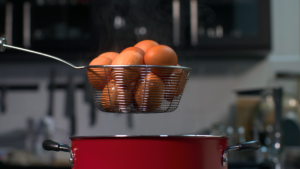In order to protect egg producers, it is necessary to take action against faulty EU decisions
The domestic egg sector has developed significantly in the past decade, however, the achieved results are threatened by the thoughtless actions of the European Commission. While the EU allows Ukrainian eggs that do not comply with EU rules into its market, it would further tighten the regulations for its own producers.

(Photo: NAK)
The Poultry Product Council and the Association of Hungarian Egg Hybrid Breeders and Egg Producers organized the 21st World Egg Day professional conference on October 13, 2023 in Budapest. At the event, Balázs Győrffy, the president of the National Chamber of Agriculture (NAK), emphasized that the domestic egg sector has achieved serious results in the past decade, despite unfavorable processes such as the bird flu or the coronavirus epidemic, and managed to increase egg consumption and improve the level of self-sufficiency. These results are now threatened by the reckless actions of the European Commission. As a result of the abolition of tariffs and quotas on Ukrainian imports last June, four times as many table eggs arrived from Ukraine in 2022 as in 2021, and in March 2023, nearly 100 million pieces, as much as in the entire year of 2021. This import, which does not comply with EU food safety, animal welfare and environmental protection regulations, has significantly narrowed the market for Hungarian and European producers. The president of NAK emphasized that while the European Commission does not demand that imported products comply with EU rules, it would further tighten the regulations for its own producers under the pressure of radical green organizations. Even though the ban on cage keeping was temporarily removed from the agenda as the European Parliament elections approached, there is no doubt that initiatives attacking animal husbandry will intensify again in the future. Agriculture, but especially animal husbandry, is constantly hit by extremely strong unjustified attacks by organizations that claim to be environmental and animal protectors.

(Photo: NAK)
Many studies prove that cage egg production is the most hygienic technology
It has the smallest environmental footprint, land, feed and water requirements, and it is also the cheapest. Its ban would be contrary to the principles of environmental, economic and social sustainability. The consequences of such an unfounded decision would cause such irreversible, long-term damage that the European Commission cannot be authorized to take responsibility for, Balázs Győrffy emphasized. He added: in order to ensure fair market competition and consumers’ right to choose, we must ensure that only food products produced in accordance with the Union’s rules can be marketed in the EU, and that the consumer can decide which egg from which farming method to choose, that this is the complete valuable protein source should be accessible to everyone. In this area, the actors of the domestic egg sector can count on the NAK for firm representation in international policy, in addition, the public body continues to support the work of the actors of the sector with its own tools and services, whether it is about professional proposals or the support of sectoral efforts.
NAK
Related news
State compensation for the victims of Bászna Gabona Zrt. has been completed
🎧 Hallgasd a cikket: Lejátszás Szünet Folytatás Leállítás Nyelv: Auto…
Read more >Related news
Innovations, success stories and awards on the same stage
🎧 Hallgasd a cikket: Lejátszás Szünet Folytatás Leállítás Nyelv: Auto…
Read more >Farewell day at the 60th anniversary EuroShop trade fair
🎧 Hallgasd a cikket: Lejátszás Szünet Folytatás Leállítás Nyelv: Auto…
Read more >NAV: Women’s Day inspections begin
🎧 Hallgasd a cikket: Lejátszás Szünet Folytatás Leállítás Nyelv: Auto…
Read more >









